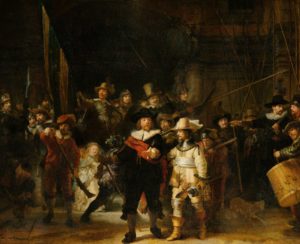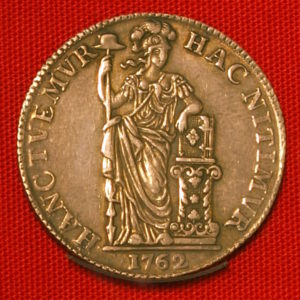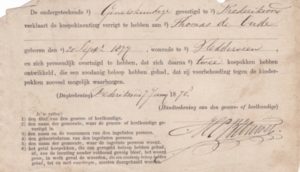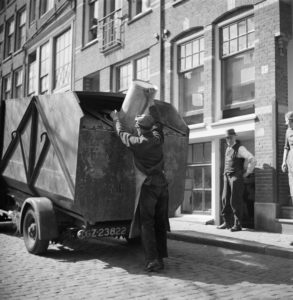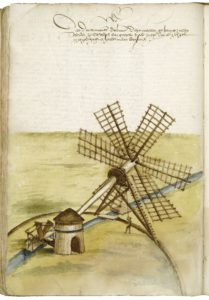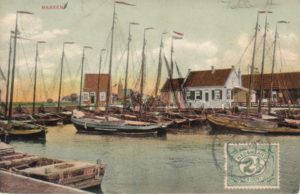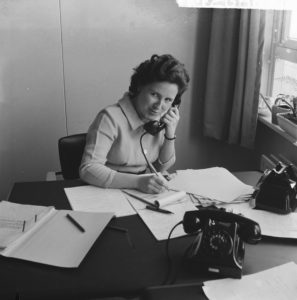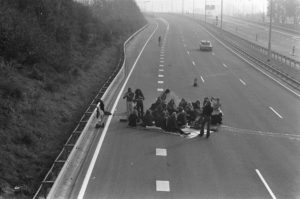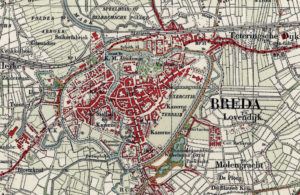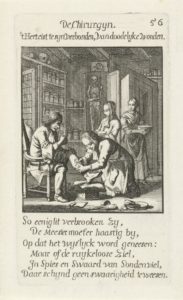The schutterij is the citizen militia responsible for the defense of the town. In times of war, they could be called up to defend the country. Schutterijen existed throughout the Netherlands from at least the 1500s. Regulations for the schutterijen were standardized in 1814. Male residents between the ages of 18 and 50 (from 1827: between 25 and 34) were elligible to serve. By law, 600 schutters were required per 20,000 residents. Schutterijen existed until 1901. Records for schutters can … [Read more...]
Dutch term – Gulden, Stuiver, Penning
In many older Dutch records, you will find sums of money noted in guldens [guilders], stuivers [stivers], and penningen [pennies]. 1 gulden = 20 stuivers 1 stuiver = 16 penningen For example, fl. 2 : 10 : 1 means 2 guilders, 10 stivers and 1 penny. Fl. is the abbreviation for florijn [florin], an old name for guilder used to denote the currency. This system remained was in use in most parts of the Netherlands until 1816. The southern parts used Flemish pounds. In 1816, the coin … [Read more...]
Dutch term – Pokkenbriefje
A pokkenbriefje is a pox letter, given by a doctor to confirm that a child has been vaccinated against the pox. In 1823, a new law required all children to submit a pokkenbriefje before they were admitted in school. Pokkenbriefjes can sometimes be found in school records. … [Read more...]
Dutch term – Selectielijst
A selectielijst literally means a selection list. Archives publish selectielijsten to announce their retention policies for records created by a specific government agency. For each series on the list, it will indicate whether it will be permantly preserved or after how many years it will be destroyed. The selectielijsten are put up for public review. After any objections have been evaluated, the minister of Education, Culture, and Science will need to formally approve it before it is … [Read more...]
Dutch term – Octrooi
An octrooi is a patent. Historically, octrooien were not just required to protect inventions, but also to enter into certain types of businesses, similar to what we'd call a permit today. An octrooi could also grant permission to publish a book in a certain area. Octrooien can often be found in the records of the landlords or the government. They typically describe the type of permission that is granted and name the patentee. … [Read more...]
Dutch term – Prentbriefkaart
A prentbriefkaart or ansichtkaart is a postcard. Postcards became popular in the early 1900s. Old postcards can give you a good idea of what the town looked like when your ancestors were living there. It's also worth asking family members if any of them have old postcards. Among the papers I inherited from my grandfather and grandmother were postcards they sent each other when they were engaged and he was serving in the military. Digitized postcards can often be found on websites of … [Read more...]
Dutch term – Notulen
Notulen are minutes. They can be found in the records created by many different types of people and organizations, such as church councils or the municipal government. They can contain a variety of information. Archival descriptions in finding aids often don't index the minutes but simply label the boxes as notulen and their period. You will have to view the original records to learn what their contents are. … [Read more...]
Dutch term – Zondag
Zondag is the Dutch word for Sunday. During the oil crisis in 1973, there were autoloze zondagen [carless Sundays] where no cars were allowed to drive to conserve energy. … [Read more...]
Dutch term – Concordans
A concordans is a translation table that gives you a mapping of a former numbering system to a newer numbering system. For example, a concordans may exist to show how old addresses translate to new addresses. I used such a table in my research into my great-grandmother Cornelia Francisca van den Heuvel to show that address C 453 in Breda was the same as Leuvenaarstraat 158. It is rare to find such translation tables for addresses, so I got lucky. Concordansen are sometimes provided in … [Read more...]
Dutch term – Chirurgijn
A chirurgijn is a barber or surgeon. In most towns most of the minor ailments were treated by a chirurgijn rather than a doctor with an academic educations. Chirurgijns learned their trade as apprentices. Larger cities had chirurgijnsgildes or surgeon guilds, that regulated entry to the trade and oversaw apprenticeships and master exams. Treatments provided by chirurgijns included blood letting, treatments of sores and skin conditions, and setting broken bones. They were also barbers who … [Read more...]
